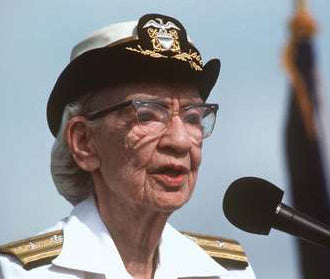Grace Hopper
Born: 9th December 1906 - Died: 1st January 1992
Grace Murray Hopper was born in December 1906 to parents Walter Fletcher Murray and Mary Campbell Van Horne. In 1928 she graduated from Vassar College with a B.A in mathematics and physics before achieving her M.A (1930) and PhD (1934) at Yale University. Her early career was spent teaching mathematics at Vassar College until 1943 when she joined the Naval Reserve.
In 1944 she was assigned to the Bureau of Ordnance's Computation Project which was based in Harvard University, where she helped work on the Mark I, which was the worlds first large-scale automatic calculator and the first step towards the computers that we use today. During her time on this project, there were unexplained errors that would occur while the Mark I was operating, this was due to moths flying into the circuitry. During this time, Grace coined the terms 'Bug' and 'Debugging' which are still used in programming today.
In 1949 she joined the Eckert-Mauchly Computer Corporation and helped develop the UNIVAC I, a competitor to the Mark I. During development Grace recommended they develop a new computer programming language which would allow programmers to type using English rather than symbols. This led to her starting to create her own compiler in 1952, this allowed for computers and programmers to start moving away from arithmetic and allowing for other things like data processing. This was the start of the COBOL language, which is still used today for data processing.
In 1954 Grace's department released two of the first compiler-based programming languages MATH-MATIC and FLOW-MATIC. Later in 1959, she helped work as a consultant on a committee that helped further design and develop the COBOL language.
Grace worked as the Director of the Navy Programming Languages Group where she helped design and develop validation software for COBOL and the compiler it used as part of a standardisation program.

